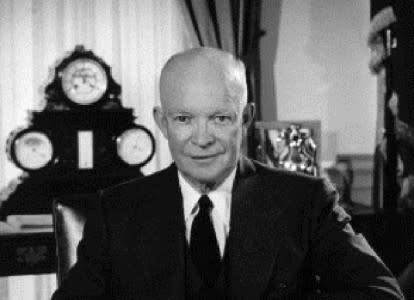The lost presidential speech made at the Gettysburg Address anniversary
It was 51 years ago today that a former president appeared and spoke to a large crowd at Gettysburg. But Dwight Eisenhower’s speech from November 19, 1963 has been lost in history as a nation was consumed by shocking news three days after it was made.
The current president on November 19, 1963, John F. Kennedy, had to turn down a request to speak at the 100th anniversary of the Gettysburg Address. He was needed to fly down to Texas to help mediate a political dispute and then take part in appearances in Dallas with Vice President Lyndon Johnson on November 22, 1963.
Kennedy did send a special statement to Gettysburg for the event, which ended with this phrase: “On this solemn occasion let us all rededicate ourselves to the perpetuation of those ideals of which Lincoln spoke so luminously. As Americans, we can do no less.”
It was a famous resident of Gettysburg, Eisenhower, who took President Kennedy’s place as a featured speaker, along with Pennsylvania Governor William Scranton. President Kennedy’s assassination in the days following the Gettysburg ceremony occupied the headlines and the Eisenhower speech wasn’t widely reprinted.
The Eisenhower speech is available from the online archives of the Eisenhower Presidential Library, and it was printed in its entirety in the local Gettysburg newspaper.
And in it, the former President and World War II leader spoke from experience about the sacrifices made at Gettysburg.
“Lincoln had faith that the ancient drums of Gettysburg, throbbing mutual defiance from the battle lines of the blue and the gray, would one day beat in unison, to summon a people, happily united in peace, to fulfill, generation by generation, a noble destiny. His faith has been justified – but the unfinished work of which he spoke in 1863 is still unfinished; because of human frailty, it always will be,” Eisenhower said.
“We read Lincoln’s sentiments, we ponder his words – the beauty of the sentiments he expressed enthralls us; the majesty of his words holds us spellbound – but we have not paid to his message its just tribute until we – ourselves – live it,” he added.
“On this day of commemoration, Lincoln still asks of each of us, as clearly as he did of those who heard his words a century ago, to give that increased devotion to the cause for which soldiers in all our wars have given the last full measure of devotion,” Eisenhower asked.
“Our answer, the only worthy one we can render to the memory of the great emancipator, is ever to defend, protect and pass on unblemished, to coming generations the heritage – the trust – that Abraham Lincoln, and all the ghostly legions of patriots of the past, with unflinching faith in their God, have bequeathed to us – a nation free, with liberty, dignity, and justice for all.”
The year of 1963 was unusual for Gettysburg because the site received visits from a former, current and future President in the same year. In addition to the March visit from Kennedy and several visits from Eisenhower, the Vice President, Lyndon Johnson, spoke on Memorial Day at Gettysburg in a very significant speech about Civil Rights.
And while President Barack Obama has been criticized for not accepting an invitation to speak at Gettysburg this year, it’s not without precedent.
A check of reports about past presidential visits to Gettysburg shows that an Obama visit to the battlefield and cemetery, on a November 19th, would probably be the first appearance of a sitting U.S. president there on the Gettysburg Address anniversary since Lincoln made his speech in 1863.
A local newspaper, the Hanover Evening Sun, ran a story last month that cited local historical records that listed the dates of every presidential visit to the battlefield. According to the paper’s reporting of documents from the Adams County Historical Society, just 16 presidents visited Gettysburg while they were in office, and it does list a William Howard Taft visit on November 19, 1909.
A quick search of Internet resources shows Taft was at the battlefield to dedicate a monument on Memorial Day in 1909, and not on November 19.
It is more traditional for Presidents to appear at Gettysburg on Memorial Day or on the anniversary of the great battle.
Six sitting Presidents spoke there on Memorial Day: Rutherford B. Hayes, Theodore Roosevelt, William Howard Taft, Calvin Coolidge, Herbert Hoover and Franklin D. Roosevelt. Another five Presidents appeared at Gettysburg around the battle anniversary: Woodrow Wilson, Warren Harding, Franklin D. Roosevelt, Harry Truman and Jimmy Carter.
President Wilson’s speech was notable because it was on the 50th anniversary of the battle and more than 50,000 Civil War veterans were in town for a memorial encampment.
More Constitution Daily Stories About Lincoln
Myths and mysteries about the Gettysburg Address
The lost presidential speech made at the Gettysburg Address anniversary


